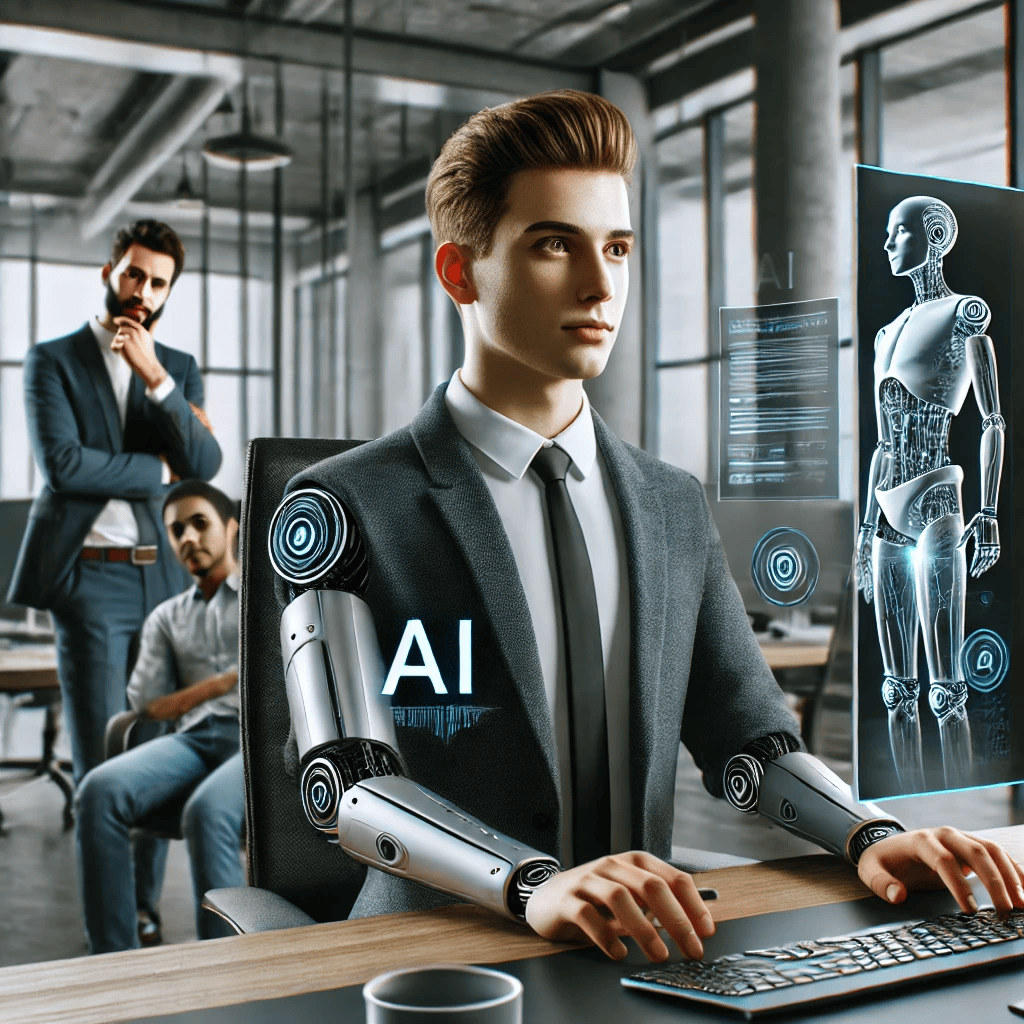AI Won’t Replace Your Job—But Someone Who Uses AI Will
The stark reality of artificial intelligence revolutionizing our workforce hits differently when you realize the true threat isn’t the technology itself—it’s your colleagues who embrace it. As the entertainment industry grapples with AI’s implications, particularly during recent labor negotiations, a profound truth emerges: AI won’t directly steal your job, but professionals who harness its power will undoubtedly surpass those who resist it. This revelation, echoing through conference halls and boardrooms alike, fundamentally changes how we should approach our relationship with artificial intelligence in the workplace. The transformation spans every sector, from creative industries to financial services, making it impossible to ignore the growing divide between AI adopters and those left behind in its wake.
We strongly recommend that you check out our guide on how to take advantage of AI in today’s passive income economy.
Table of Contents
The Current State of AI in the Workforce
Understanding the Real Threat
The recent Screen Actors Guild negotiations brought this reality into sharp focus, with performers expressing valid concerns about AI-generated avatars potentially replacing human talent. However, this perspective might be missing the larger picture of how AI integration actually occurs in professional settings. The true disruption isn’t coming from AI autonomously taking over jobs—it’s emerging from professionals who leverage AI to multiply their productivity, creativity, and problem-solving capabilities. These individuals aren’t being replaced by AI; they’re becoming exponentially more valuable by mastering it as a tool in their professional arsenal.
Industry-Wide Impact
From Silicon Valley startups to Wall Street firms, organizations are rapidly discovering that their most efficient employees aren’t those with the most traditional experience—they’re the ones who effectively combine their expertise with AI capabilities. This shift is particularly evident in content creation, where creators who embrace AI tools for ideation, editing, and optimization consistently outperform their peers in both quantity and quality of output. The financial sector has seen similar transformations, with analysts using AI to process vast amounts of data and generate insights that would have taken weeks to produce manually.
The Evolution of Professional Skills
Adapting to the New Reality
The professional landscape is undergoing a fundamental shift where traditional skills alone no longer guarantee career security. Today’s successful professionals are those who view AI as a powerful collaborator rather than a threat. This mindset shift requires understanding that AI tools aren’t designed to replace human creativity, judgment, and emotional intelligence—they’re meant to enhance these uniquely human capabilities. The most successful professionals in any field are increasingly those who master the art of prompt engineering, understanding how to effectively direct AI tools to augment their work rather than attempting to resist their integration.
Real-World Applications
Consider the transformation in content creation and marketing. Professionals who leverage AI for tasks like content optimization, audience analysis, and engagement tracking can manage workloads that would traditionally require entire teams. These individuals aren’t letting AI do their job—they’re using AI to do their job better, faster, and with greater impact. The key distinction lies in understanding that AI serves as a force multiplier for human capability rather than a replacement for human insight.
Strategies for Success in an AI-Enhanced Workplace
Embracing AI as a Professional Tool
Success in the modern workplace increasingly depends on viewing AI as an essential professional tool, much like previous technological innovations that transformed industries. Just as professionals who mastered spreadsheet software in the 1980s gained significant advantages over those who clung to manual calculations, today’s AI-savvy professionals are creating similar competitive advantages. This requires a proactive approach to learning and experimenting with AI tools, understanding their capabilities and limitations, and identifying specific ways they can enhance your particular role.
Developing AI Literacy
Professional development now must include building strong AI literacy—understanding how to effectively communicate with AI tools, knowing which tasks are best suited for AI assistance, and recognizing when human judgment should take precedence. This literacy extends beyond simple tool usage to understanding the broader implications of AI integration in your industry. Professionals who develop this literacy position themselves as valuable assets who can bridge the gap between traditional business practices and AI-enhanced operations.
The Future of Work
Creating Value in an AI-Enhanced Economy
The future belongs to professionals who understand that value creation in an AI-enhanced economy comes from unique combinations of human and artificial intelligence. This requires developing skills that complement rather than compete with AI capabilities. Critical thinking, emotional intelligence, creative problem-solving, and strategic planning become even more valuable when augmented by AI’s data processing and pattern recognition capabilities. The most successful professionals will be those who master this symbiotic relationship.
Building Sustainable Career Advantages
Creating sustainable career advantages in an AI-enhanced workplace requires a fundamental shift in how we approach professional development. Rather than viewing AI as a threat to be defended against, successful professionals are treating AI literacy as a core competency to be developed and refined. This means staying current with AI capabilities, understanding emerging use cases in your industry, and continuously experimenting with new ways to integrate AI tools into your workflow.
Conclusion
The message is clear: the choice isn’t between humans and AI—it’s between professionals who leverage AI and those who don’t. As AI tools become more sophisticated and accessible, the gap between these two groups will only widen. The professionals who thrive will be those who embrace AI as a powerful ally in their professional journey, using it to enhance their capabilities rather than viewing it as a threat to their livelihood. The future of work isn’t about competing with AI; it’s about mastering it as a tool for professional enhancement and career advancement.
Looking Ahead
The transformation of the workplace through AI integration is inevitable, but the impact on individual careers isn’t predetermined. By embracing AI tools, developing AI literacy, and focusing on skills that complement AI capabilities, professionals can position themselves for success in an increasingly AI-enhanced economy. The key is to start now, experiment continuously, and remain adaptable as AI capabilities evolve. Remember: AI won’t replace your job—but someone who uses AI will.

We strongly recommend that you check out our guide on how to take advantage of AI in today’s passive income economy.




